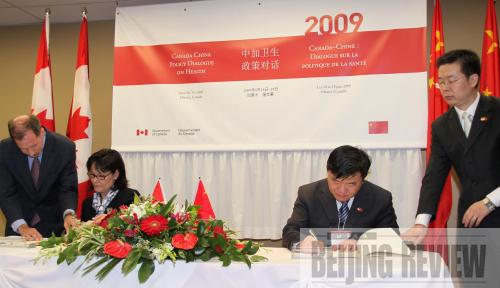|
Harper should make a China visit "a high priority," he said.
Conservative Senator Hugh Segal also supported a Harper visit to Beijing, "I certainly hope it happens as soon as possible. I think it would be a very good signal."
In a commentary in the Globe and Mail newspaper's online edition, Yuen Pau Woo of the Asia Pacific Foundation of Canada and Wang Huiyao of the Center for China and Globalization in Beijing said they saw "exciting possibilities" in a revived relationship, notably the potential for Chinese investment in Canada facilitated by the large number of Chinese-Canadians who could act as an economic bridge between the two countries.
 |
| COOPERATION: Chinese Health Minister Chen Zhu and Canadian Health Minister Leona Aglukkaq sign a Plan of Action for continued cooperation between 2009 and 2011 on health issues of mutual concern in Ottawa on June 19 (XINHUA) |
Still, it would be unwise to think the difficulties of the recent past are over. Harper's new, more accommodating line on China will alienate parts of his own party who favor a more robust assertion of "Canadian values."
Yang's speech hinted at the potential for trouble when he said the two sides would be well advised "not to interfere in other countries' internal affairs"—a clear reference to critical Canadian comments on the human rights, Tibet and Taiwan issues. It is questionable, though, whether Harper or members of his party could refrain from speaking out again in the event of a crisis in any of those areas.
There is also the issue of whether Canada is well positioned to take economic advantage of warmer relations with China. A report earlier this year by Professor Charles Burton of Brock University, who has twice served as a councillor at the Canadian Embassy in Beijing, was sharply critical of the competence of Canadian diplomatic personnel, saying their Chinese language skills were poor and their knowledge of the Chinese political system inadequate. "Our diplomats typically lack fluency in Chinese, and therefore lack the capacity to establish informal contacts with influential policymakers in the Chinese system," he wrote.
Canadian businesses, too, have not been particularly aggressive in the Chinese market, although trade has continued to expand. China accounts for only 6 percent of Canada's merchandise trade, compared with almost 80 percent for the United States. The story is the same for investment. Almost 44 percent of Canada's international investments in 2007 were made in the United States and only 0.3 percent in China.
Indeed, it is almost impossible to talk about Sino-Canadian relations without making reference to the United States. From 1970, when diplomatic relations were established, to 2006, when Harper became prime minister, Canadian governments have used the relationship with China to balance the political and economic influence of the United States. This was particularly true of Jean Chrétien, Liberal prime minister from 1993 to 2003, who aggressively promoted Sino-Canadian trade and was bold enough to criticize America's "cowboy-style attitude" during the 2001 Hainan Island incident.
When Harper took power, he rejected the Liberals' emphasis on multilateralism and put renewed emphasis on good relations with Washington. On most foreign policy issues, he reflected American thinking, and in Asia tilted away from Beijing toward Tokyo and Taipei.
Now, even though he is trying to restore Canada's China connection, he remains a firm U.S. ally. At present, Sino-American relations are generally constructive, but conflicting territorial claims in the South China Sea, ongoing American arms sales to Taiwan and Chinese concerns about the pervasive American military presence around its frontiers mean the relationship remains delicate.
At the same time, Canada's relations with the United States are deepening both economically and politically. Most recently, the two countries became partners in the bailout of the North American auto industry and they will likely unite in a cap-and-trade carbon emissions system. Canadian anxiety about tight new American border restrictions—a significant threat to the Canadian economy—make Ottawa favorably disposed to considering a continent-wide approach to border security. Some prominent Canadians are promoting a new bilateral trade deal with the United States that would exclude Mexico and bind the American and Canadian economies even closer together. The end result could well be that future Canadian prime ministers will find it much more difficult to balance Washington and Beijing the way Chrétien did.
Perhaps, though, those concerns should be left for the future. Canada and China are making a determined effort to get relations back on track. There may be some dark clouds on the horizon, but the two countries deserve to enjoy the current diplomatic sunshine.
The author is an editor at The Toronto Star. In 1989-90 and 2000-01 he was a member of the editorial staff of Beijing Review.
(The view in this article does not necessarily represent that of Beijing Review.)
| 